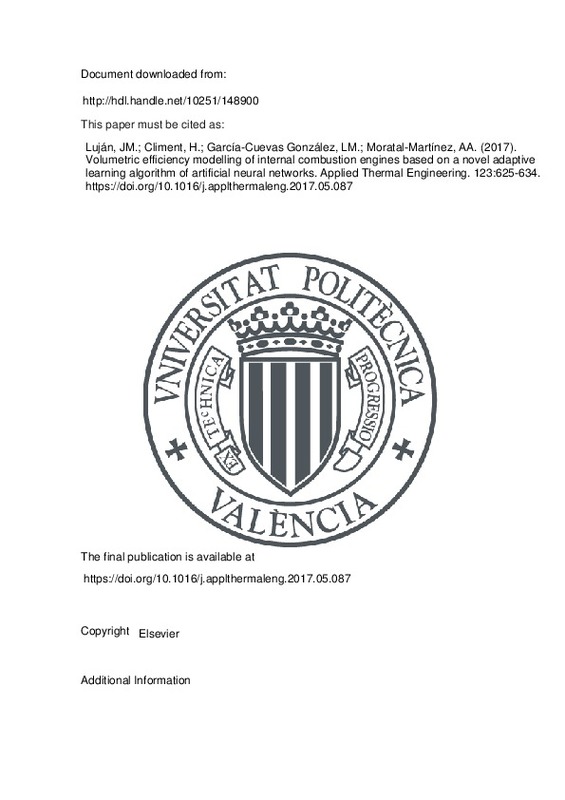JavaScript is disabled for your browser. Some features of this site may not work without it.
Buscar en RiuNet
Listar
Mi cuenta
Estadísticas
Ayuda RiuNet
Admin. UPV
Volumetric efficiency modelling of internal combustion engines based on a novel adaptive learning algorithm of artificial neural networks
Mostrar el registro sencillo del ítem
Ficheros en el ítem
| dc.contributor.author | Luján, José M.
|
es_ES |
| dc.contributor.author | Climent, H.
|
es_ES |
| dc.contributor.author | García-Cuevas González, Luis Miguel
|
es_ES |
| dc.contributor.author | Moratal-Martínez, Ausias Alberto
|
es_ES |
| dc.date.accessioned | 2020-07-30T03:35:21Z | |
| dc.date.available | 2020-07-30T03:35:21Z | |
| dc.date.issued | 2017-08 | es_ES |
| dc.identifier.issn | 1359-4311 | es_ES |
| dc.identifier.uri | http://hdl.handle.net/10251/148900 | |
| dc.description.abstract | [EN] Air mass flow determination is one of the main variables on the control of internal combustion engines. Effectiveness of intake air systems is evaluated through the volumetric efficiency coefficient. Intake air systems characterization by means of physical models needs either significant amount of input data or notable calculation times. Because of these drawbacks, empirical approaches are often used by means of black-box models based on Artificial Neural Networks. As alternative to the standard gradient descendent method an adaptive learning algorithm is developed based on the increase of hidden layer weight update speed. The results presented in this paper show that the proposed adaptive learning method performs with higher learning speed, reduced computational resources and lower network complexities. A parametric study of several Multiple Layer Perceptron (MLP) networks is carried out with the variation of the number of epochs, number of hidden neurons, momentum coefficient and learning algorithm. The training and validation data are obtained from steady state tests carried out in an automotive turbocharged diesel engine. (C) 2017 Elsevier Ltd. All rights reserved. | es_ES |
| dc.description.sponsorship | Authors want to acknowledge the "Apoyo para la investigacion y Desarrollo (PAID)", grant for doctoral studies (FPI S1 2015 2512), of Universitat Politecnica de Valencia. | es_ES |
| dc.language | Inglés | es_ES |
| dc.publisher | Elsevier | es_ES |
| dc.relation.ispartof | Applied Thermal Engineering | es_ES |
| dc.rights | Reconocimiento - No comercial - Sin obra derivada (by-nc-nd) | es_ES |
| dc.subject | Artificial neural networks | es_ES |
| dc.subject | Adaptive learning | es_ES |
| dc.subject | Diesel engines modelling | es_ES |
| dc.subject | Volumetric efficiency | es_ES |
| dc.subject.classification | INGENIERIA AEROESPACIAL | es_ES |
| dc.subject.classification | MAQUINAS Y MOTORES TERMICOS | es_ES |
| dc.title | Volumetric efficiency modelling of internal combustion engines based on a novel adaptive learning algorithm of artificial neural networks | es_ES |
| dc.type | Artículo | es_ES |
| dc.identifier.doi | 10.1016/j.applthermaleng.2017.05.087 | es_ES |
| dc.relation.projectID | info:eu-repo/grantAgreement/UPV//FPI-S1-2015-2512/ | es_ES |
| dc.rights.accessRights | Abierto | es_ES |
| dc.contributor.affiliation | Universitat Politècnica de València. Departamento de Máquinas y Motores Térmicos - Departament de Màquines i Motors Tèrmics | es_ES |
| dc.description.bibliographicCitation | Luján, JM.; Climent, H.; García-Cuevas González, LM.; Moratal-Martínez, AA. (2017). Volumetric efficiency modelling of internal combustion engines based on a novel adaptive learning algorithm of artificial neural networks. Applied Thermal Engineering. 123:625-634. https://doi.org/10.1016/j.applthermaleng.2017.05.087 | es_ES |
| dc.description.accrualMethod | S | es_ES |
| dc.relation.publisherversion | https://doi.org/10.1016/j.applthermaleng.2017.05.087 | es_ES |
| dc.description.upvformatpinicio | 625 | es_ES |
| dc.description.upvformatpfin | 634 | es_ES |
| dc.type.version | info:eu-repo/semantics/publishedVersion | es_ES |
| dc.description.volume | 123 | es_ES |
| dc.relation.pasarela | S\338240 | es_ES |
| dc.contributor.funder | Universitat Politècnica de València | es_ES |







![[Cerrado]](/themes/UPV/images/candado.png)

